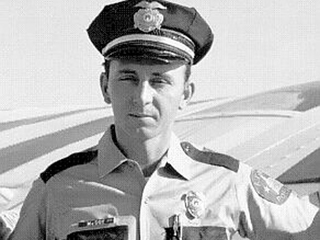 On August 1st, 1966 a twenty-five year old man took several firearms onto the observation platform of a building at the University of Texas. He killed sixteen people that day - his mother and his wife, three innocents in the building itself, and eleven more from his perch twenty-eight floors up. Among his victims was twenty-two year old Austin police officer Billy Speed, shot to death in the company of other cops responding to the shooting. Thirty-two people were wounded
On August 1st, 1966 a twenty-five year old man took several firearms onto the observation platform of a building at the University of Texas. He killed sixteen people that day - his mother and his wife, three innocents in the building itself, and eleven more from his perch twenty-eight floors up. Among his victims was twenty-two year old Austin police officer Billy Speed, shot to death in the company of other cops responding to the shooting. Thirty-two people were woundedPicking his way through the carnage, riding an elevator up toward a madman, Houston McCoy led fellow Austin officer Ramiro Martinez out onto the deck. There, the two confronted the man McCoy would refer to ever after only as "the sniper." Both McCoy and Ramirez fired shots that hit the murderer - in the end both received credit for the rounds that ended the killing.
Officer McCoy left law enforcement and became a flight instructor. He battled alcoholism and PTSD. His children remember him as the man who raised them in the country, to be self-sufficient and drive "anything with wheels, once we could see over the steering wheel." Friends called him a "great police officer, and a great friend."
Houston McCoy died on December 27th, the same day as General Norman Schwarzkopf. Fitting - both of them rejected the label "hero," preferring to be remembered as men who answered the call of duty.
Rest in peace, Officer.
Generally the people who most deserve the hero title are the ones least likely to accept it; another true sign they deserve it. They see it as their job and that's why they're heroes.
ReplyDeleteYour Grandpa Dave always said that the real heroes nver made it off Iwo Jima, that he was just a little kid from Philly who did his job.
ReplyDelete